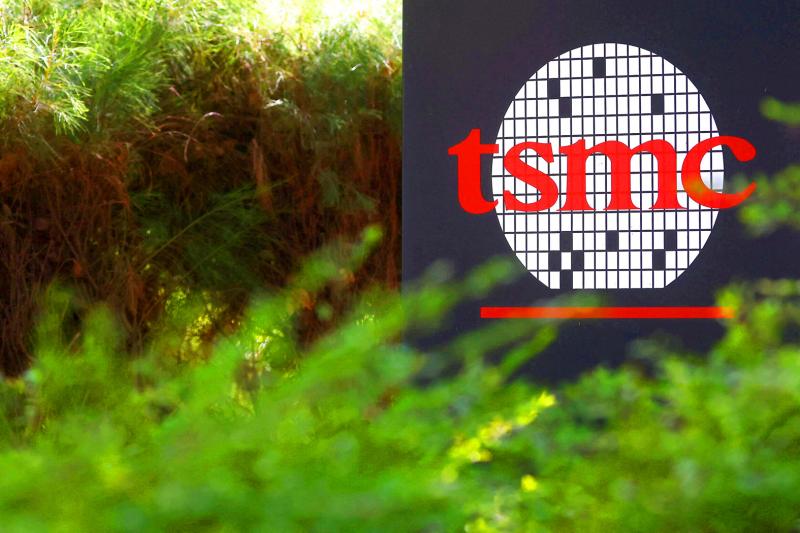Taiwan Semiconductor Manufacturing Co (TSMC, 台積電), the world’s largest contract chipmaker, paid NT$55 billion (US$1.84 billion) in corporate income tax last year, retaining its title as Taiwan’s biggest contributor, data compiled by the Ministry of Finance showed.
TSMC was the only company in Taiwan to pay more than NT$50 billion in corporation income tax last year, after the chipmaker posted a record profit of NT$596.54 billion, up more than 15 percent from 2020.
Chinese-language media reported that the chipmaker accounted for about 8.4 percent of the NT$652.4 billion in total corporate income tax revenue collected by the ministry last year, a 10 percent year-on-year increase.

Photo: Ann Wang, Reuters
After TSMC, Yang Ming Marine Transport Corp (陽明海運), one of Taiwan’s leading cargo shippers, took second place, paying about NT$27 billion in corporate income tax for profits made last year, the data showed.
Yang Ming benefitted from a freight rate surge driven by a shortage in cargo shipping services, robust demand and serious port congestion worldwide.
Fellow shipping line Wan Hai Lines Ltd (萬海航運) was the third-largest taxpayer, paying more than NT$15 billion in corporate income tax, the reports said.
Evergreen Marine Corp (長榮海運), Taiwan’s largest container cargo shipper, ranked fourth, paying more than NT$12 billion, the reports said.
The National Taxation Bureau’s branch responsible for New Taipei City, Taoyuan, and Hsinchu city and county collected the largest share of corporate tax among the taxation bureau’s five branches, with NT$256 billion last year, up more than NT$100 billion, or 64.16 percent, from a year earlier.
The bureau’s tax revenue was boosted by major tech companies with production bases in the Hsinchu Science Park (新竹科學園區), which is home to TSMC’s headquarters.

South Korea’s equity benchmark yesterday crossed a new milestone just a month after surpassing the once-unthinkable 5,000 mark as surging global memory demand powers the country’s biggest chipmakers. The KOSPI advanced as much as 2.6 percent to a record 6,123, with Samsung Electronics Co and SK Hynix Inc each gaining more than 2 percent. With the benchmark now up 45 percent this year, South Korea’s stock market capitalization has also moved past France’s, following last month’s overtaking of Germany’s. Long overlooked by foreign funds, despite being undervalued, South Korean stocks have now emerged as clear winners in the global market. The so-called “artificial intelligence

NEW IDENTITY: Known for its software, India has expanded into hardware, with its semiconductor industry growing from US$38bn in 2023 to US$45bn to US$50bn India on Saturday inaugurated its first semiconductor assembly and test facility, a milestone in the government’s push to reduce dependence on foreign chipmakers and stake a claim in a sector dominated by China. Indian Prime Minister Narendra Modi opened US firm Micron Technology Inc’s semiconductor assembly, test and packaging unit in his home state of Gujarat, hailing the “dawn of a new era” for India’s technology ambitions. “When young Indians look back in the future, they will see this decade as the turning point in our tech future,” Modi told the event, which was broadcast on his YouTube channel. The plant would convert

‘SEISMIC SHIFT’: The researcher forecast there would be about 1.1 billion mobile shipments this year, down from 1.26 billion the prior year and erasing years of gains The global smartphone market is expected to contract 12.9 percent this year due to the unprecedented memorychip shortage, marking “a crisis like no other,” researcher International Data Corp (IDC) said. The new forecast, a dramatic revision down from earlier estimates, gives the latest accounting of the ongoing memory crunch that is affecting every corner of the electronics industry. The demand for advanced memory to power artificial intelligence (AI) tasks has drained global supply until well into next year and jeopardizes the business model of many smartphone makers. IDC forecast about 1.1 billion mobile shipments this year, down from 1.26 billion the prior

People stand in a Pokemon store in Tokyo on Thursday. One of the world highest-grossing franchises is celebrated its 30th anniversary yesterday.